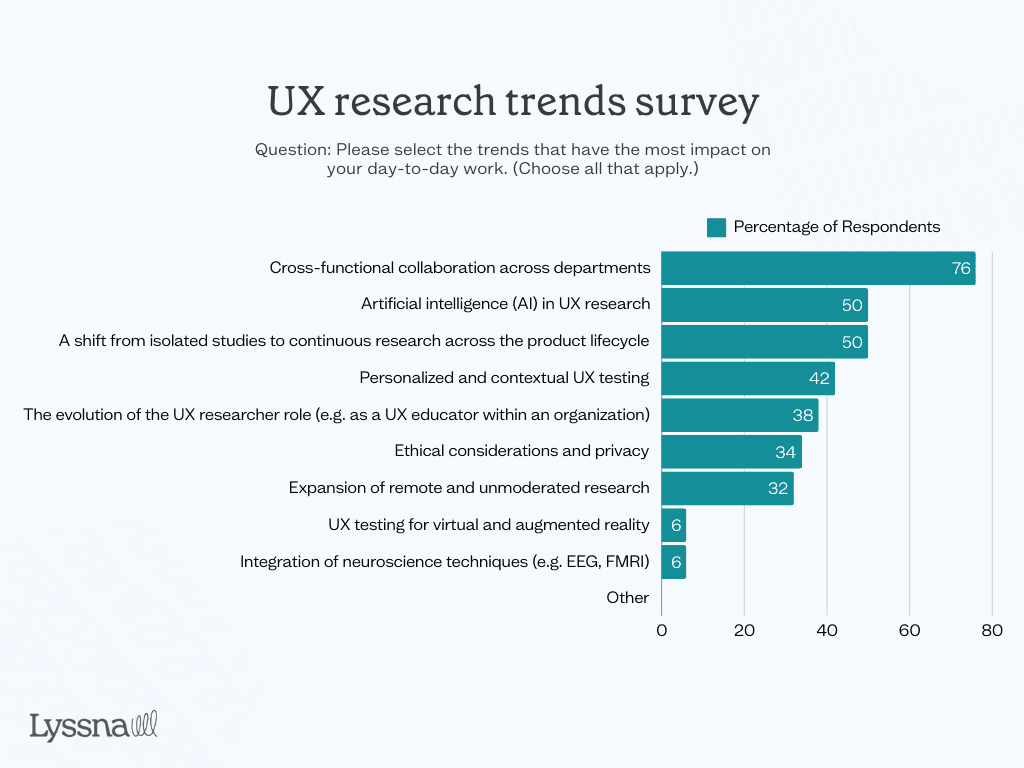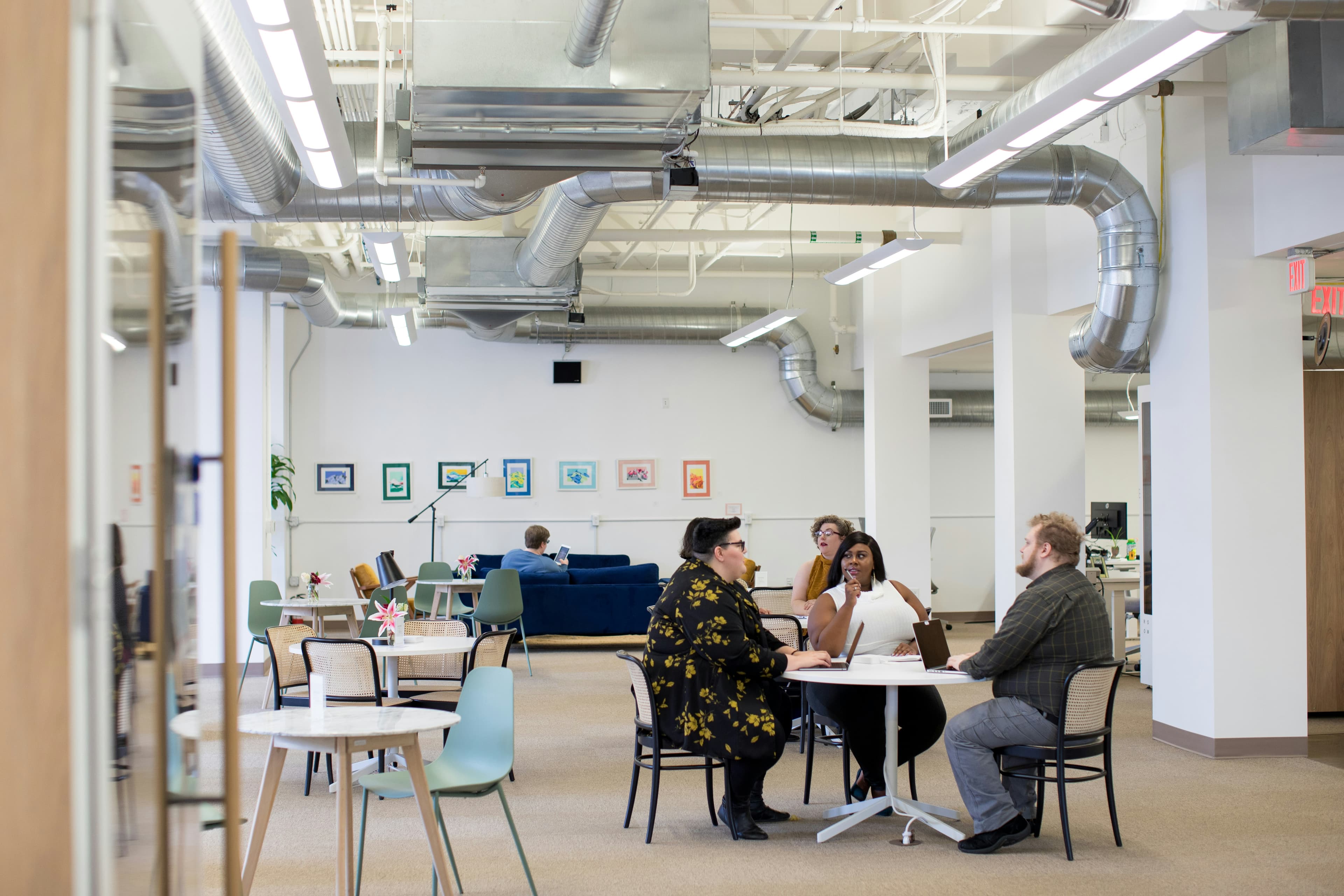14 Nov 2025
|10 min
UX research trends for 2025
Discover key UX research trends for 2025, from AI and accessibility to evolving roles and methods.

The field of user experience (UX) research is constantly evolving, driven by the ever-changing landscape of technology and user expectations. As we approach 2025, it's crucial for UX researchers to stay ahead of the curve and adapt to emerging trends that will shape the industry.
For this article, we surveyed 50 UX researchers from the Lyssna research panel to gather their perspectives. They shared valuable insights, which we’ll explore in detail. Here’s what we’ll cover:
The role of AI in UX research
Shifting approaches to UX research
How the UX researcher role is evolving
The growing focus on accessibility and diversity in UX research
The future of remote research
Let’s start with the big elephant in the room: artificial intelligence (AI).
1. The use of AI in UX research
Artificial intelligence (AI) has taken the world by storm, and companies in various industries have found great uses for it. In 2023, PwC said that more than two-thirds of all respondents they surveyed reported that implementation of GenAI was either already in progress or planned for the next 12 months.
However, in Forrester's 2024 State of Generative AI report, we saw that over 90% of enterprise AI-related decision-makers have definitive plans to adopt GenAI for internal and customer-facing use cases.
But have researchers adopted AI as earnestly as other professionals? According to our survey, the use of AI in UX research came out as the second most impactful trend (50% of respondents) in researchers' day-to-day work.

Here are a few excerpts of the written answers in response to our question "Do you think AI will have a significant impact on UX research? If so, how?":
"Yes, now it helps me a lot with my work and the analysis and synthesis of user insights and finding commonalities. It helps me with the preparation of the research whether a survey, discussion guide, etc. Also, user testing tools that automate insights with smart AI is such a great help."
"I think so. I think it is for interviews and transcriptions now but as I said I am excited about the synthetic users. I am also anxious about the use and abuse of those concepts."
The second quote brings up an interesting prediction we could see emerging in 2025 – the use of synthetic users through tools like Synthetic Users.
Overall, these survey responses align closely with the insights shared by user researcher Michele Ronsen outlined in her article on AI’s role in qualitative research. In her article, Michele highlights that her research respondents identified the top AI applications as:
Brainstorming
Background research
Transcription
Rudimentary analysis
The conclusion of her research suggests that "the juice isn't worth the squeeze, yet." However, with AI models improving quickly, this may well change in 2025.
Stay ahead of UX research trends!
Discover how Lyssna can transform your research approach. Get insights faster, collaborate seamlessly, and leverage cutting-edge tools. Start today and revolutionize your UX research!
2. The evolution of the UX researcher role
Of course, the role of the UX researcher has naturally evolved over time, influenced by AI and other technological innovations. As organizations increasingly recognize the distinctions between ux research vs ux design, these changes affect both the tasks researchers perform and how their role is perceived within organizations. Kasia Jordan-Kaźmierczak, a user researcher at Survicate, made the following observation:
“As a UX researcher, I find myself navigating a landscape of contrasts. On the one hand, it feels like we’re in the midst of a transition characterized by the growing UX maturity in the market, with businesses recognizing the intrinsic value that UX research brings to product development.
In the wider industry and my practice, we’re shifting towards methods rooted in continuous research discovery rather than ad-hoc initiatives. This strategic pivot encourages a deeper, more sustained engagement with user needs and a culture of ongoing learning and collaboration.”
Our survey data also reflects this, with "a shift from isolated studies to continuous research across the product lifecycle" being the joint-second most impactful trend in researchers' day-to-day work.
The UXX researcher role has expanded beyond user interviews, testing, and improving the customer experience. With rapid technological changes in the industry, it now also involves staying up-to-date, continuously learning, and educating others in the organization. Recent insights from a customer experience study highlight how researchers are adapting to these changes. Leizel Laron, a UX/UI designer at exaweb, made the following comment:
“As a UI/UX designer, in order to get myself up in the game, I should be able to keep up with the changes and trends of advancing technologies. I strongly see the potential of AI as a great tool for researchers and designers. It’s a big help in terms of accessibility and faster timeframe. However, it cannot replace the researchers/designers who still have a full, in-depth understanding of the behaviors of the users.”
Of course, many folks in the UX industry are learning about AI at the moment, but technological innovation is always happening. Through self-directed learning, UX researchers will be expected to stay on top of these wider industry changes.

3. Changes in approach to UX research
As the UX researcher role evolves, these changes also influence UX research methods and practices. In our survey, 38% of researchers felt that the evolution of their role had the greates impact on their day-to-day work.
In her comment above, Kasia Jordan-Kaźmierczak mentioned a shift towards a continuous product discovery approach to UX research. She’s not the only expert we spoke to who mentioned this change. Nat Miletic, owner and CEO of Clio Websites, also talked about this change:
“We adopt a continuous UXR approach at every stage of the product lifecycle. This continuous discovery enables teams to monitor potential problems proactively, even before they manifest, as we add new functions and features. We employ feedback surveys within the product to acquire valuable real-time insights, and we rotate the respondents regularly to gather diverse perspectives and experiences.
Continuous discovery is a welcome change as a UX researcher. An ongoing optimization and feedback process helps the team make smarter and quicker decisions.”
This continuous discovery approach and quick decision-making show UX research is becoming a more holistic business function.
Our survey data reflects this trend, with "cross-functional collaboration across departments" cited as the most impactful factor in researchers’ day-to-day work (76%).
This shift to a more holistic, user-centered approach highlights the growing emphasis on deeply understanding consumer behavior.

4. Emphasizing accessibility in UX research
While considering accessibility in UX research has (or should have) always been a non-negotiable, our survey data suggests there’s an increased focus on it moving into 2025.
In particular, one of our respondents specifically mentioned new EU directives:
"Since there is a new directive in the EU that will regulate accessibility requirements starting from June 2025, more research is being done in the field of accessibility."
But what's different? Quite a few of our survey respondents highlighted an increased focus on including users with disabilities in research studies, such as:
"Accessibility in UX research is becoming increasingly important. Researchers are focusing on including users with disabilities in their studies and designing research methods that are inclusive and accessible to all participants."
Another researcher also mentioned:
"Conducting UX research on groups with different disabilities."
This comment suggests that researchers ought to be able to make different recommendations based on different types of user disabilities. Additionally, another researcher highlighted accessibility for older users:
"Moving towards inclusiveness to accommodate older participants (or participants with low technology familiarity) that might struggle with high-tech tools."
These updates in UX research protocols will be a welcome change for users who are most impacted by accessibility in UX design in 2025. For SaaS companies, focusing on saas ux design is particularly crucial, as it ensures that software solutions remain user-friendly and accessible

5. Is remote research here to stay?
As with many other industries, the COVID-19 pandemic caused considerable shifts in how UX researchers work. The chief shift was a move to remote working. However, with the change in approach towards qualitative research and holistic product design processes, is remote research here to stay? Nearly five years down the line, we're pretty confident with our answer.
José Moya of We Are Capicua, a UX-driven full-cycle product development company, has the following thoughts:
“There has been an increased emphasis on remote user testing and usability studies, driven by the global shift towards virtual work environments. This transition has allowed for a broader reach and more diverse participant pool, but it also necessitates adapting methodologies to ensure remote sessions are as practical as in-person ones.”
These adaptations naturally include using UX research tools designed to conduct remote user research, like the ones we offer at Lyssna.
Updated research from Gallup tells us that in Q2 2024, virtually 80% of US employees with remote-capable jobs either worked remotely or used a hybrid work model. The availability of remote research tools and companies accepting remote working models suggests that remote research is indeed here to stay.
Start exploring innovative UX research methods with Lyssna
If you’re a researcher or someone who conducts research, chances are you nodded in agreement with at least a few of the trends and opinions highlighted in this article.
You can unlock new possibilities and deliver exceptional user experiences by embracing the potential of AI, adapting to new approaches, leveraging tech innovations, and conducting remote research.
At Lyssna, we understand the importance of staying ahead in the ever-evolving field of UX research. Our platform provides powerful remote usability testing tools that enable you to gather user insights at scale.
Unlock next-level UX insights
Ready to embrace the future of UX research? Lyssna empowers you with remote tools and continuous discovery capabilities. Try for free and elevate your research game!

Alexander Boswell
Technical writer
Alexander Boswell is a product-led content writer and researcher with a background in marketing strategy and consumer behaviour. When he’s not writing, he’s playing baseball and D&D.
You may also like these articles


Try for free today
Join over 320,000+ marketers, designers, researchers, and product leaders who use Lyssna to make data-driven decisions.
No credit card required





